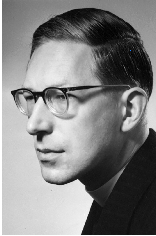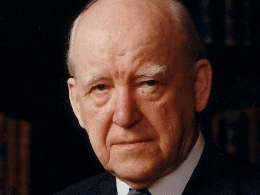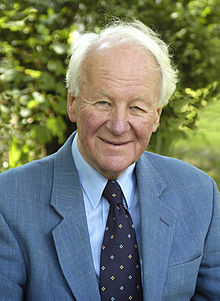The International Fellowship of Evangelical Students (IFES) is an interdenominational association of 180 evangelical Christian student movements worldwide, encouraging evangelism, discipleship and mission among students. The headquarters is in Oxford, England.

All Souls Church is a conservative evangelical Anglican church in central London, situated in Langham Place in Marylebone, at the north end of Regent Street. It was designed in Regency style by John Nash and consecrated in 1824.

James Innell Packer was an English-born Canadian evangelical theologian, cleric and writer in the low-church Anglican and Calvinist traditions. Having been considered as one of the most influential evangelicals in North America, Packer is known for his 1973 best-selling book Knowing God, along with his work as the general editor of the English Standard Version Bible. He was one of the high-profile signers on the 1978 Chicago Statement on Biblical Inerrancy, a member on the advisory board of the Council on Biblical Manhood and Womanhood, and also was involved in the ecumenical book Evangelicals and Catholics Together in 1994. His last teaching position was as the board of governors' Professor of Theology at Regent College in Vancouver, British Columbia, in which he served from 1996 until his retirement in 2016 due to failing eyesight.
The Lausanne Covenant is a July 1974 religious manifesto promoting active worldwide Christian evangelism. One of the most influential documents in modern evangelicalism, it was written at the First International Congress on World Evangelization in Lausanne, Switzerland, where it was adopted by 2,300 evangelicals in attendance.

David Martyn Lloyd-Jones was a Welsh Congregationalist minister and medical doctor who was influential in the Calvinist wing of the British evangelical movement in the 20th century. For almost 30 years, he was the minister of Westminster Chapel in London.
Vaughan Edward Roberts is a Church of England clergyman. Since 1998, he has been the rector of St Ebbe's, Oxford. In 2009, he became Director of the Proclamation Trust.
Douglas R. Groothuis is an American Christian philosopher who is a professor of philosophy at Cornerstone University. Groothuis was a campus pastor for twelve years prior to obtaining a position as an associate professor of philosophy of religion and ethics at Denver Seminary from 1993 to 2024. In August 2024, he joined Cornerstone as the Distinguished Professor of Apologetics and Christian Worldview. He was educated at the University of Wisconsin–Madison and the University of Oregon. He was married to Rebecca Merrill Groothuis until her death on July 6, 2018.
Donald George Bloesch was an American evangelical theologian. For more than 40 years, he published scholarly yet accessible works that generally defend traditional Protestant beliefs and practices while seeking to remain in the mainstream of modern Protestant theological thought. His seven-volume Christian Foundations series has brought him recognition as an important American theologian.
Richard Charles Lucas is an Anglican evangelical cleric, best known for his long ministry at St Helen's Bishopsgate in London, England, and for his work as founder of the Proclamation Trust and the Cornhill Training Course.

Eric John Hewitson "Bash" Nash was a conservative evangelical Church of England cleric. His work of Christian evangelism and camp ministry in the top thirty public schools of the United Kingdom from 1932 onwards was highly influential in the post-war British evangelical resurgence. Over 7,000 boys attended the Iwerne camps under his leadership.
Conservative evangelicalism is a term used in the United Kingdom to describe a theological movement found within evangelical Protestantism. The term is used more often in this sense, but conservative evangelicals themselves tend to use it interchangeably and synonymously with evangelical. Conservative evangelicals are sometimes called fundamentalists, but they typically reject that label and are keen to maintain their distinct identity, which is more Reformed. Reformed fundamentalism shares many of the characteristics of conservative evangelicalism. In this sense, conservative evangelicalism can be thought of as distinct from liberal evangelicalism, open evangelicalism, and charismatic evangelicalism. Some conservative evangelical groups oppose the ordination of women as ministers or clergy and/or women holding leadership positions.
Christopher J. H. Wright is a missiologist, an Anglican clergyman and an Old Testament scholar. He is currently the International Ministries Director of Langham Partnership International. He was the principal of All Nations Christian College. He is an honorary member of All Souls Church, Langham Place in London, UK.
In Christianity, annihilationism is the belief that after the Last Judgment, all damned humans and fallen angels including Satan will be totally destroyed and their consciousness extinguished rather than suffering forever in Hell. Annihilationism stands in contrast to both the belief in eternal torment and to the universalist belief that everyone will be saved. However, it is also possible to hold to a partial annihilationism, believing unsaved humans to be obliterated, but demonic beings to suffer forever.
Langham Partnership is a nonprofit Christian international fellowship working in pursuit of the vision of its founder John Stott: to foster the growth of the global church in maturity and Christ-likeness by raising the standards of biblical preaching and teaching through equipping Majority World Christian pastors, scholars, writers, publishers, and other key leaders. In 2005, TIME magazine named Stott among the 100 most influential people in the world.
Todd Dean Hunter is an American author, church planter, and bishop in the Anglican Church in North America (ACNA). He is the founding diocesan bishop of The Diocese of Churches for the Sake of Others. In 2021, Hunter founded the Center for Formation, Justice and Peace, an interdenominational community that seeks to develop the Christlike character necessary to activate justice, leading to a life of deep peace for all people.

Evangelical Anglicanism or Evangelical Episcopalianism is a tradition or church party within Anglicanism that shares affinity with broader evangelicalism. Evangelical Anglicans share with other evangelicals the attributes of "conversionism, activism, biblicism and crucicentrism" identified by historian David Bebbington as central to evangelical identity. The emergence of evangelical churchmanship can be traced back to the First Great Awakening in America and the Evangelical Revival in Britain in the 18th century. In the 20th century, prominent figures have included John Stott and J. I. Packer.
Oliver Rainsford Barclay was a British academic and evangelical Christian. Originally a zoologist, he later turned his attentions to widening the influence of conservative evangelical Christianity within universities and theological colleges. He was General Secretary of the Universities and Colleges Christian Fellowship from 1964 to 1980, and also Chair of the International Fellowship of Evangelical Students from 1971 to 1979. In 1989, he co-founded the journal Science and Christian Belief.

C. René Padilla was an Ecuadorian evangelical theologian and missiologist known for coining the term integral mission in the 1970s to articulate Christianity's dual priority in evangelism and social activism. He popularized this term in Latin American evangelicalism through the Latin American Theological Fellowship and through the global evangelical Lausanne Conference of 1974.

Chua Wee Hian is a Singaporean Evangelical, known for his longterm role as General Secretary of the International Fellowship of Evangelical Students from 1972 to 1991.

The Iwerne camps, officially the Varsity and Public Schools (VPS) holidays and later Iwerne and Forres Holidays, and commonly known as Bash camps, were British evangelical Christian holiday camps aimed at children from UK public schools.








